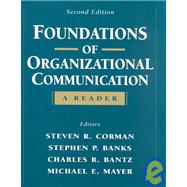
I. COMMUNICATION AND ORGANIZATIONS.
1. That Works Fine in Theory, but … , Steven R. Corman.
2. Organizational Communication: Historical Development and Future Directions, Linda L. Putnam and George Cheney.
3. Why Bureaucracy?, Charles Perrow.
4. Social Collectivities as Communication, Leonard C. Hawes.
II. PERSPECTIVES.
5. The Principles of Scientific Management, Fredrick W. Taylor.
6. Automating the Worker, Joseph Gies.
7. How Must Business Management Develop in Order to Possess the Essentials of a Profession? M.P. Follett.
8. The Theory of Formal Organization, Chester I. Barnard.
9. Of Words and Men, F.J. Roethlisberger.
10. The New Workforce Meets the Changing Workplace: Strains, Dilemmas, and Contradictions in Attempts to Implement Participative and Entrepreneurial Management, Rosabeth Moss Kanter.
11. Banana Time: Job Satisfaction and Informal Interaction, Donald F. Roy.
12. Organizations and the Systems Concept, Daniel Katz and Robert L. Kahn.
13. The Causal Texture of Organizational Environments, F.E. Emery and E.L. Trist.
14. The Cost of Intervention in Nature, Garrett Hardin.
15. An Introduction to Organizing, Karl Weick.
16. Organizing and Enactment: Karl Weick and the Production of News, Charles Bantz.
17. Communication and Organizational Cultures, Michael E. Pacanowsky and Nick O'Donnell-Trujillo.
18. Cultural Terms and Tensions in the Speech at a Television Station, Donal Carbaugh.
III. ORGANIZATIONAL COMMUNICATION CONCEPTS AND ISSUES.
19. The Fine Art of Issuing Orders, Herbert A. Simon.
20. The Rhetoric of Identification and the Study of Organizational Communication, George Cheney.
21. Task/Work Relationships: A Life-Span Perspective, Fredric M. Jablin.
22. The Manager's Job: Folklore and Fact, Henry Mintzberg.
23. The Doppleganger Effect, Warren Bennis.
24. Ambiguity as Strategy in Organizational Communication, Eric M. Eisenberg.
25. Whistleblowing and Leaks, Sissela Bok.
26. The Bases of Power: Origins and Recent Developments, Bertrand H. Raven.
27. Organizational Power as Communicative, Praxis Stephen P. Banks.
28. Numbers: Minorities and Majorities, Rosabeth Moss Kanter.
29. The Memo Every Woman Keeps in Her Desk, Kathleen Reardon.
30. Stephen Cruz, Studs Terkel.
31. Communication Networks in Organizations, Everett Rogers and R. Argawala-Rogers.
32. Norms and Values in a Conflict Situation, Bruce Kapferer.
33. When the Links Become Chains: Considering Dysfunctions on Supportive Communication in the Workplace, Eileen Berlin Ray.
IV. EPILOGUE.
34. The Twilight of Hierarchy: Speculations on the Global Information Society, Harlan Cleveland.
35. Silicon Valley Mystery House, Langdon Winner.
36. Post-Capitalist (An Interview with Peter Drucker), Peter Schwartz.
Index.
The New copy of this book will include any supplemental materials advertised. Please check the title of the book to determine if it should include any access cards, study guides, lab manuals, CDs, etc.
The Used, Rental and eBook copies of this book are not guaranteed to include any supplemental materials. Typically, only the book itself is included. This is true even if the title states it includes any access cards, study guides, lab manuals, CDs, etc.